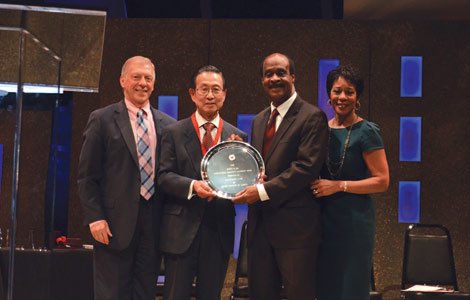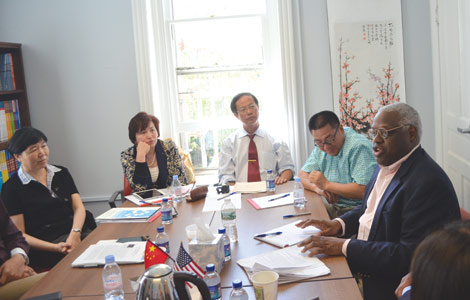Guangdong seeks rural students for top universities
Updated: 2014-04-29 08:22
By Li Wenfang in Guangzhou (China Daily)
|
||||||||
Guangdong's education authorities will create a detailed plan to recruit high school graduates from impoverished rural areas across the country into key universities in the province.
The move is part of an expanded program under the Ministry of Education to recruit 50,000 students from poor rural areas into key universities nationwide this year.
Apart from the 832 poor counties in last year's program, universities in this year's program will also recruit students from 10 provinces and autonomous regions, including Guangdong, Anhui and Gansu provinces, and the Guangxi Zhuang autonomous region, which have relatively few students admitted to key universities.
Key universities are required to recruit no less than 2 percent of their undergraduate students from the 832 poor counties and 10 targeted provinces and autonomous regions.
In his Government Work Report presented at the annual session of the National People's Congress last month, Premier Li Keqiang pledged to continue expanding the recruitment of students from poor regions into key universities this year.
Admission of such students increased from 10,000 students in 2012 to 30,000 students last year, with 152 more poor areas and 41 more key universities included in the program.
Cui Shaowei from Lincheng, Henan province, who is majoring in engineering equipment and control engineering at the South China University of Technology, is one of the students benefiting from the policy.
"I would have been able to go to only an average university of technology with my college entrance exam results last year, but now I am here at SCUT. I'm grateful for this policy," he said.
Wang Peini, who is a freshman majoring in safety engineering at SCUT and another beneficiary of the policy, said: "Our recruitment was held before the normal recruitment drive. It gives students from poor rural areas more opportunities."
An increase in the number of students from poor rural areas is socially important and better embodies the concept of improving lives with knowledge, said Lu Xiaozhong, dean of the College of Education Science at South China Normal University.
The proportion of rural students in college recruitment is key because it is associated with the balance among social classes.
Looking at the entire education system, restrictions in other aspects come as the recruitment of rural students expands, Lu said.
SCUT and Sun Yat-sen University, both based in Guangzhou, capital of Guangdong, have announced their own programs for this year, according to the provincial student recruitment committee.
The SCUT program, Building the Dream, aims to narrow the educational gap among regions, according to the student recruitment work office of the university.
The schools that students who were recruited under SCUT's program can choose include the School of Materials Science and Engineering, the School of Chemistry and Chemical Engineering, the College of Environment and Energy, and the School of Economics and Commerce.
Applicants will take tests in math and physics, get an interview with the university as well as undergo the national college entrance exam.
Sun Yat-sen University offers 35 majors in fields including math, physics, chemistry, literature, history and philosophy to students from poor areas.
He Baoqi contributed to this story.
Most Viewed
Editor's Picks

|

|

|

|

|

|
Today's Top News
NBA bans Clippers owner from game for life over racist commen
China's CEOs confident
Alibaba IPO could be the biggest
Chinese youths get their chance at stardom and recording deals
Cookiemaker announces plans to roll into smaller cities
Bill Gates urges more in China to help poor
Philippine pact gives US access to air, sea bases
Obama sets new sanctions on Russia
US Weekly

|

|















